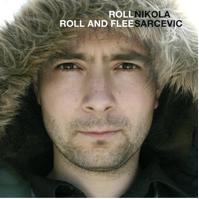Any fan of Millencolin knows what to expect from Nikola Sarcevic: nigh-irritatingly catchy melodies and simple lyrics that allow for moments of astute observation. This didn't change on his solo debut, 2004's Lock-Sport-Krock, and it hasn't changed on Roll Roll and Flee.
Roll Roll and Flee was released in Europe on Burning Heart Records last year, but it has yet to see American release. This is disappointing, as it is an enormous leap forward from the bargain bin-worthy songs that made up two-thirds of Lock-Sport-Krock.
Sarcevic's first album was great in spots, but overall sounded like acoustic punk songs. Just like many of Sarcevic's peers, his solo sound didn't vary much from his full-time band, save for a lack of distortion and speed. On Roll Roll and Flee, however, he has come into his own as a solo artist, with a `70s pop/folk sound similar to that explored by a few of his labelmates that have also gone solo, namely Greg Graffin and Dennis Lyxzèn. There is an interesting variety of instruments on this album, and one of my personal favorites is the harmonica, which is played with a precision and necessity that so many singer-songwriters fail to achieve. Throughout the whole of Roll Roll and Flee, I am amazed by the level of musicianship and the coherence of the songs. It's not that the parts are impressively complex, but that they are played almost effortlessly. Of particular note is how well-suited the drums are for this style. They're never flashy, but obviously not placed under Sarcevic's guitar as an afterthought.
From the interesting chorus melody on "From Where I'm Standing" to the line "'Even Christians are afraid of dying,' I think I heard you say," Sarcevic's wordplay proves impressive on this album. The lyrical content is relatively depressing, and the music compliments it, only approaching upbeat on a few country rock numbers. In an age where many of his contemporaries are aping `60s folk and hillbilly music, it's interesting that Sarcevic's more direct influences seem to be Simon and Garfunkel, the Eagles, Jackson Browne, Nick Drake and the like.
Despite all of this, the album fails to completely stay with the listener. The stronger songs stick, much like the strong songs off of Sarcevic's debut, but the others are initially forgettable. Unlike Lock-Sport-Krock, however, Roll Roll and Flee's weaker songs are not weak themselves, only in comparison to the better songs. This may have prevented this album from receiving more notice in 2006, but it bodes well for Sarcevic's future output. Personally, I am enjoying this album more and more as I listen to it.
The bottom line is that this album will largely appeal to fans of Millencolin AND poppy folk songs. It is not a mindblowing album that will change your view of music. But the songs are very good, which, by itself, is something rare. If anything I have said has piqued your interest, find a way to listen to this album.
